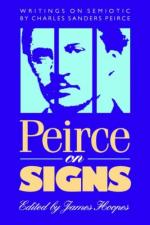|
This section contains 5,049 words (approx. 17 pages at 300 words per page) |

|
SOURCE: "Peirce on 'Substance' and 'Foundation'," in The Monist, Vol. 75, No. 4, October, 1992, pp. 492-503.
In the following excerpt, Potter presents an overview of Peirce's categories and discusses Peirce's views on substantiality and empiricism.
Charles S. Peirce has a great deal to contribute both to understanding and to solving many of the philosophical problems which puzzle contemporary thinkers. In fact it is probably true that in some ways philosophers of our time are in a better position to understand Peirce's thought than those of his own day. In this paper I would like to consider two puzzling notions: 1) the substantiality of things (including the "self), and 2) the foundations of human knowledge.
1. Substance
The substantiality of things has been challenged at least since the time of the Enlightenment. The question is whether an existing thing (like the self) is, and can be known to be, something which lasts over time...
|
This section contains 5,049 words (approx. 17 pages at 300 words per page) |

|


